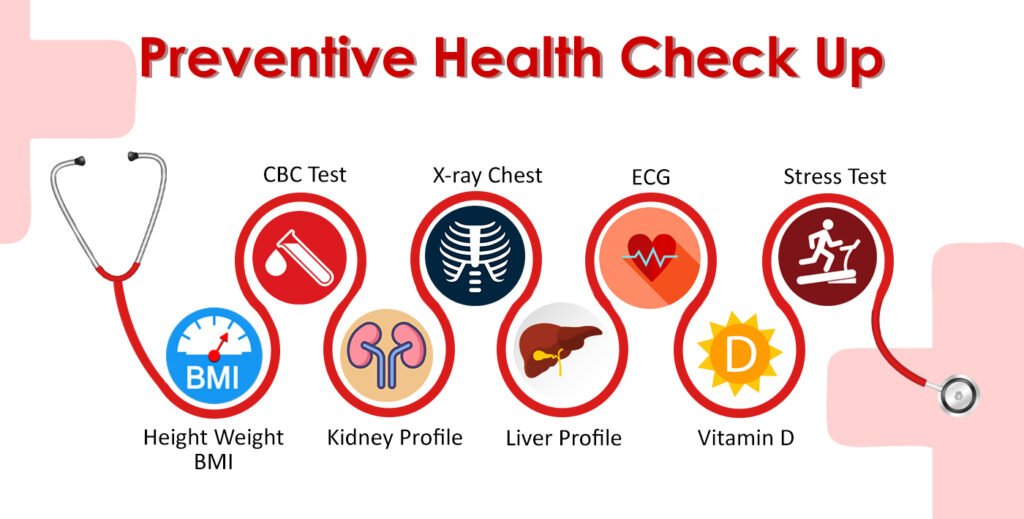
Importance of Regular Health Checkups: A Key to a Healthy Life
Regular Health Checkups
In today’s fast-paced world, most people tend to ignore their health until a problem arises. We often visit doctors only when we fall sick or experience discomfort. However, regular health checkups play a crucial role in preventing diseases, detecting potential health issues early, and maintaining overall well-being. Just as we service our vehicles to keep them running smoothly, our bodies also need regular “servicing” to ensure everything functions properly.
In this article, we’ll explore why regular health checkups are essential, what benefits they offer, and how you can make them a part of your lifestyle.
Why Are Regular Health Checkups Important?
Health checkups are not just about identifying existing illnesses—they’re about preventing them. Many diseases, including diabetes, heart disease, and cancer, develop silently without showing early symptoms. By the time symptoms appear, the condition may already be advanced. Regular checkups help in early detection, making treatment easier, faster, and more effective.
Moreover, health screenings give you a clear picture of your body’s current state. They provide valuable insights into your blood pressure, cholesterol levels, sugar levels, liver and kidney function, and more. This knowledge empowers you to take preventive measures and adopt a healthier lifestyle.
Early Detection Can Save Lives

One of the biggest advantages of regular health checkups is early diagnosis. Detecting diseases at an early stage increases the chances of successful treatment and recovery. For instance:
- Cancer screening: Regular screenings for breast, cervical, and prostate cancers can catch the disease before it spreads.
- Heart checkups: Routine ECGs and cholesterol tests can identify heart problems before they lead to heart attacks.
- Diabetes monitoring: A simple blood test can help you manage sugar levels and avoid long-term complications.
Early detection not only saves lives but also reduces medical costs and stress associated with late-stage treatments.
Preventive Care Is Better Than Cure
There’s an old saying—“Prevention is better than cure.” Regular checkups allow you to take preventive steps before a health issue becomes serious. For example:
- If your doctor notices slightly elevated blood pressure, you can make lifestyle changes before it turns into hypertension.
- If your cholesterol levels are high, you can adjust your diet and exercise routine before heart problems arise.
Preventive healthcare is cost-effective and helps maintain long-term health, especially as you age.
Mental Health Matters Too
While physical health checkups are common, mental health assessments are equally important. Stress, anxiety, and depression are rising due to work pressure and lifestyle habits. During regular visits, doctors can evaluate your emotional well-being and guide you toward counseling, therapy, or relaxation techniques if needed. A healthy mind supports a healthy body.
The Role of Lifestyle Diseases
Lifestyle diseases such as obesity, hypertension, and diabetes are becoming increasingly common due to sedentary lifestyles, poor eating habits, and stress. Regular health checkups help monitor these conditions and guide individuals toward better habits.
For instance, if your test results show high sugar levels, your doctor may recommend dietary adjustments, more physical activity, and regular monitoring. Catching these issues early can prevent complications like kidney failure, nerve damage, or heart disease later on.
Key Health Tests Everyone Should Consider
The type and frequency of health checkups may vary based on age, gender, and medical history. However, some common tests are beneficial for most adults:
- Blood Pressure Check: Monitors heart health and helps detect hypertension.
- Blood Sugar Test: Helps in early detection of diabetes or prediabetes.
- Lipid Profile: Measures cholesterol and triglyceride levels.
- Liver and Kidney Function Tests: Assesses how well your organs are performing.
- Complete Blood Count (CBC): Detects infections, anemia, and other blood disorders.
- Thyroid Function Test: Monitors metabolism and hormone balance.
- BMI and Weight Check: Tracks obesity and related risks.
- Cancer Screenings: Depending on age and family history (e.g., mammograms, Pap smears, colonoscopies).
Your doctor may suggest additional tests based on your health conditions or risk factors.
Benefits of Regular Health Checkups
Here are some of the main benefits of maintaining a routine health check schedule:
- Early Diagnosis: Helps in catching potential health problems early.
- Prevention: Keeps chronic diseases under control before they worsen.
- Peace of Mind: Reduces anxiety about your health when you know your status.
- Health Awareness: Encourages better understanding of your body and its needs.
- Longer, Healthier Life: Supports longevity through timely interventions.
Regular checkups are not a luxury—they’re an investment in your future health.
How Often Should You Go for a Health Checkup?
The frequency of health checkups depends on your age, medical history, and lifestyle. As a general rule:
- Ages 20–30: Every 2–3 years (unless you have health issues).
- Ages 30–40: Every 1–2 years for basic health screening.
- Ages 40 and above: Once a year for a comprehensive health checkup.
- If you have chronic conditions like diabetes, high blood pressure, or heart disease—more frequent visits are advisable.
Always consult your doctor to decide the best schedule for you.
Tips to Make Health Checkups a Habit
It’s easy to skip checkups when you feel healthy, but making them a regular part of your life can make all the difference. Here are some simple tips:
- Set reminders on your phone or calendar.
- Choose a trusted healthcare provider where you feel comfortable.
- Track your results to notice improvements or warning signs.
- Reward yourself for staying consistent with your health goals.
- Encourage family members to join you—it’s easier when done together.
Final Thoughts
Your health is your greatest asset. Regular health checkups are not just for detecting diseases but for ensuring long-term wellness. They empower you to take control of your health, make informed choices, and live a balanced, happy life.
Ignoring your body’s needs today might lead to complications tomorrow—but by scheduling regular checkups, you’re investing in a healthier, more energetic, and worry-free future.
So don’t wait for symptoms to appear. Book your health checkup today and give your body the care it deserves.

Aiman Fatima
October 5, 2025“Great reminder that prevention is better than cure! 🌿 Regular health checkups help us stay ahead of potential health issues and live a healthier life. Who else schedules their checkups every year? 🩺💙”